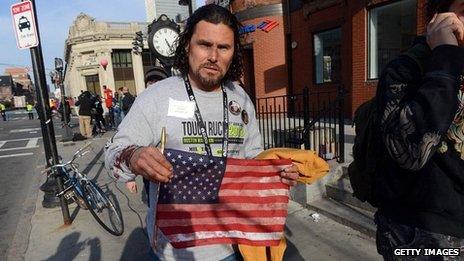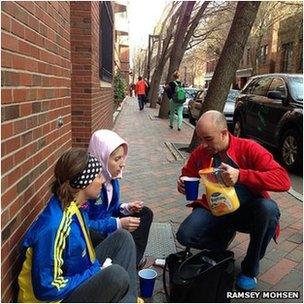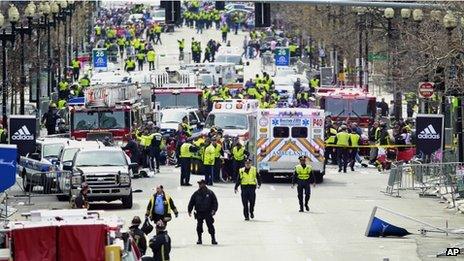Boston: Blood and panic at finish line
- Published

Costa Rican peace activist Carlos Arredondo has been praised after rushing to the aid of a badly injured man
Twin explosions in Boston have struck at the heart of one of America's cities as runners completed its marathon, one of the great feats of human spirit and endurance.
An eight-year-old boy, Martin Richard, was killed by the first blast, caught in the carnage as he watched the race at the finish line with his family.
Martin's mother and sister, six, were badly injured. Martin's mother received emergency surgery for a head injury, and his sister was treated for a leg wound.
Boston Globe journalist Kevin Cullen told the BBC that a firefighter friend of his, who picked up the injured girl, described the scene as worse than anything he had seen while serving in Iraq and Afghanistan.
At a city hospital, two brothers - said to have been standing next to the boy who was killed - are now recuperating. Each lost a leg in the explosion.
"I feel sick," the boys' mother, Liz Norden, told the Boston Globe, external newspaper from the hospital. "I think I could pass out."
"I'd never imagined in my wildest dreams this would ever happen."
The large crowds gathered for the marathon meant there was no shortage of witnesses to the horror.
"The explosion utterly shook my body, I could feel it in my heart," Ramsey Mohsen told the BBC.

Ramsey Mohsen and Ali Hatfield were given food and drink by locals
Mr Mohsen, a digital strategist from Kansas City, was in Boston watching his girlfriend, Ali Hatfield, compete in the race.
After congratulating her, the pair were little more than 100ft (35m) from the finish line when the first explosion went off.
"Out of nowhere there were two loud explosions. Everyone had gone from happy and smiling and full of excitement from running the race to complete silence.
"People didn't know how to react."
Stunned by the explosions, the couple attempted to reach their hotel, and were given food and fruit juice by kindly Bostonians before they made it through security and back to their sanctuary.
Writing on her blog, external hours after the carnage, Ms Hatfield described the panic among the crowd.
"Seeing a huge group of people with a panicked look on their face was so scary," she wrote.
"I keep thinking about the what-ifs. What if we had not finished when we did? What if we were not with our families when the explosions went off? What if, what if, what if."
Boston's Mayor Thomas Menino, already in hospital recovering from surgery to repair a broken leg, checked himself out to take up his position at the city's command post.
"The marathon is a great day in the city of Boston, but we had a tragedy," Mr Menino said from a wheelchair.
"I offer my condolences and prayers to the victims."

Among those victims was a young man who appears to have been saved by a Costa Rican peace activist, Carlos Arredondo.
Mr Arredondo survived a suicide attempt after his US Marine son was killed in Iraq, before seeing his other son take his own life in 2011.
Mr Arredondo was hailed as a hero after a striking and graphic picture emerged from Boston of him wheeling a badly injured man for treatment.
Apparently the victim had lost both legs but had his life saved by Mr Arredondo's application of a tourniquet.
In a YouTube video, external that emerged later on Monday, a visibly shaken Mr Arredondo told a questioner he found "blood, blood everywhere".
"So much was happening, I just concentrated on that young man, tying up his legs... and I managed to take him away to the ambulance."
Elite runner Josh Cox, now a US athletics commentator, said the race was usually a festival of sport and a great day out.
"The majority make it to the finish line to see... friends and family finish," he said.
"We run because of the spectators - they give us courage, they give us motivation," 2012 winner Wesley Korir of Kenya, an early finisher in Monday's race, told the BBC.
"To see this you worry about the future because you never know if they will come back next year... are there going to be spectators, how many people are going to register, how many people are going to be scared?"
- Published16 April 2013
- Published15 April 2013
- Published16 April 2013